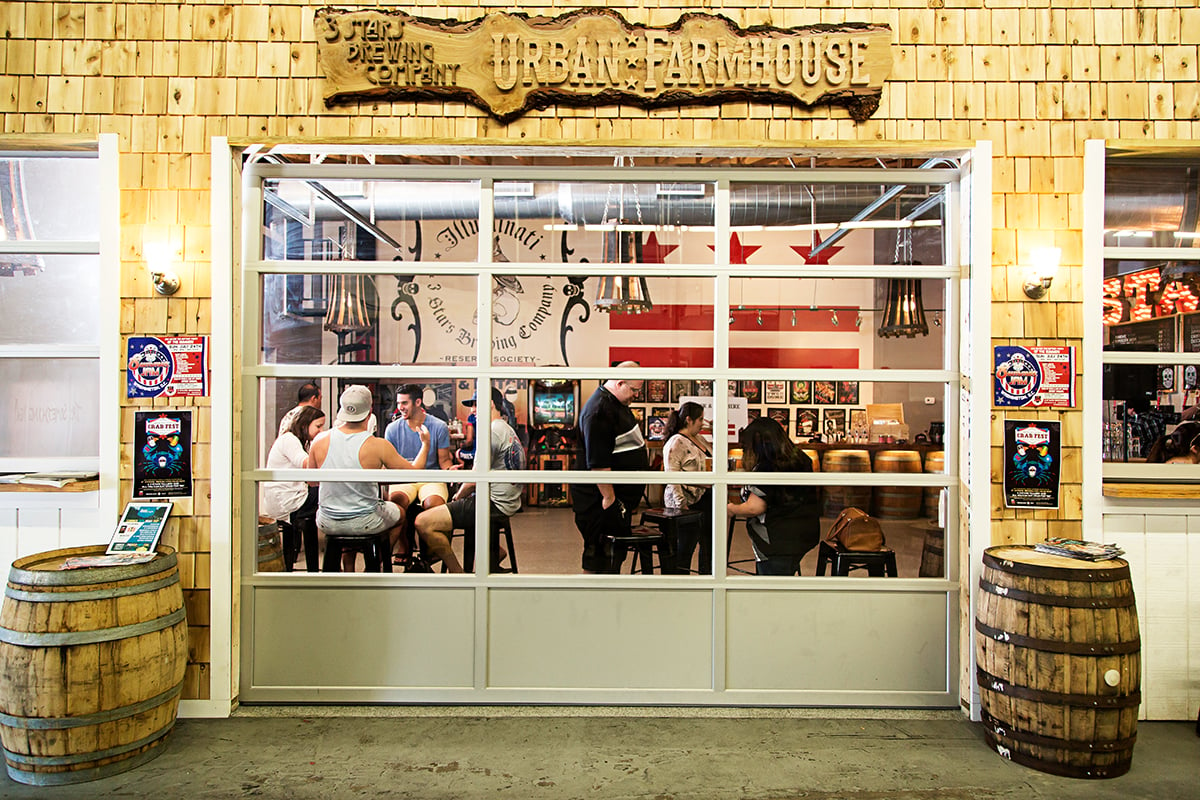Features editor William O'Sullivan can be reached at bosullivan@washingtonian.com.
Lisa Couturier lusts after coyotes.
"Seeing a coyote for longer than a moment was, to be honest, an experience I felt I deserved," she writes. "A need, really, the origins of which . . . had grown from the attempts we all make to understand the misunderstood creatures in one's life, whether they be people or animals."
Couturier's new book, The Hopes of Snakes: And Other Tales From the Urban Landscape, might be called a manifesto for misunderstood creatures. She writes about bald eagles at Great Falls, beavers on the C&O Canal towpath, foxes in Rock Creek Park.
"We tend to be consumed by the areas in which we live, which are very humanized landscapes," says Couturier, who grew up in Rockville and lives with her husband and two daughters in Bethesda. "But there are still a lot of nonhuman things out there. I wanted to bring that awareness to people."
After hearing that the roosting site of crows on Montgomery County's Montrose Road has been lost to development, she tracks the birds along Rockville Pike, hoping to find their new home. She had been awestruck by them years before on a visit home from Manhattan, where she lived at the time:
"The noise melted over the car. Flying above me was a river of crows . . . . Before I'd moved away to New York, I rode by this little forest countless times . . . . Funny how places in your hometown become so deeply embedded in you that you no longer really see them."
She drives through evening rush hour from Congressional Plaza to White Flint Mall and back to Montrose, discovering that the roosting site is still there but has been split up by construction.
These black birds, so often maligned–"Must beauty be a requirement?" she writes–are still making do today.
"You can see them if you sit at Panera on East Jefferson Street," she says. "Anytime between October and March around five o'clock, there will be thousands of crows flying overhead. People look up and say, 'Eagles!' "
Education is a goal of the book. "It helps us connect," she says, "because sometimes the stories we think we know about animals aren't the way things are–especially with snakes, most of which aren't going to hurt us."
She writes of an Oktoberfest where a black rat snake appears. While others wonder how to kill it, Couturier–who was shown by an expert how to handle snakes–finds herself fearfully moving toward the creature: "And then, in a moment, as in the way a breeze can stir out of nowhere, my heart went calm when I lifted the snake up close to my chest and guided its long black body around my arm . . . . Through crowds of people and quite a long way across the grass and back to a woodpile by the edge of the autumn forest we went."
A former editor at Redbook and New Woman, Couturier left magazines to earn an interdisciplinary master's degree from New York University. "I would never call myself a naturalist or scientist," she says, "just a very interested party in what's around us."
Citing statistics predicting that 80 percent of the US population will live in cities by 2010, Couturier says, "If we're going to live here, and if the animals are coming back–such as coyotes and foxes–we need to share the landscape with them instead of saying, 'This is our land and that's theirs along the river.' We need to learn to live in a community with them."
Family Hour
" The 1970s were particularly stressful for our family. In addition to my parents' relationship, deteriorating throughout the decade with the steadiness of a John Philip Sousa march, the health craze was beginning to take shape and it threatened us. Come Saturday afternoons, when families could be seen across the American landscape collectively elevating their heart rates, we were still sitting at our kitchen table, occasionally the four of us together, reading the paper and licking the remainder of blintzes and sour cream–whole cream–off our plates."
–from Mutual Life & Casualty, a novel out this month by DC's Elizabeth Poliner about two sisters in a troubled Jewish family.
Recent and New
Two witty novels with Washington ties came out in January: Prep by Curtis Sittenfeld is about an Indiana girl out of her element in a tony New England boarding school. Sittenfeld teaches English at DC's St. Albans School. Rockville Pike: A Suburban Comedy of Manners by Susan Coll is about a woman drawn into her in-laws' discount-furniture business on the street of the title. Coll is married to former Washington Post managing editor Steve Coll.
Nani Power tells a more serious story in The Sea of Tears, set in a DC hotel. The characters include an Iraqi technician in the boiler room, a front-desk clerk, an Iranian conference attendee, the hotel chef, and a Brazilian living in the penthouse. Power is the author of Crawling at Night and The Good Remains.
Using plentiful anecdotes, Post reporter Robert O'Harrow Jr. lends narrative drive to a potentially dry subject in No Place to Hide: Behind the Scenes of Our Emerging Surveillance Society.
In God's Politics: Why the Right Gets It Wrong and the Left Doesn't Get It, Jim Wallis of the local evangelical group Sojourners argues that faith-based politics and activism shouldn't be exclusive to Republicans.
In February, critically praised DC author Daniel Silva releases Prince of Fire, his eighth thriller starring art restorer and occasional Israeli spy Gabriel Allon.
DC's Howard Norman takes a break from fiction with In Fond Remembrance of Me: A Memoir of Myth and Uncommon Friendship in the Arctic. The unusual book recalls Norman's time in Canada translating Inuit tales. In the process, he develops a friendship with a terminally ill woman translating the stories into Japanese.
Judith Warner, a DC author whose books include one about Hillary Clinton and another written with Howard Dean, should have a ready-made audience for Perfect Madness: Motherhood in the Age of Anxiety, an engaging exploration of parenting's demands and conflicts.
Garrett Park's most prolific author, Paul Dickson, turns to The Bonus Army: An American Epic. Cowritten with Bethesda's Thomas B. Allen, the book tells the story of 45,000 World War I veterans who camped out in DC in 1932 to protest the withholding of bonus pay promised them. They were an inspiration for 1944's GI Bill of Rights.
A League of Their Own
" Ruling classes have always believed in their own right to rule, but it once was understood–at least by anyone who cared to think seriously about the matter–that their place in the social order was arbitrary, an accident of birth or breeding, rather than a matter of cosmic justice. . . . For today's Harvard students, who have passed test after exam and interview upon interview, there is nothing accidental or random about their position in society. They belong exactly where they are . . . ."
–from Privilege: Harvard and the Education of the Ruling Class by DC writer Ross Gregory Douthat, a 2002 Harvard graduate; the book, due next month, is part memoir, part social critique.
Out at the same time is Harvard Rules: The Struggle for the Soul of the World's Most Powerful University by Richard Bradley, formerly Richard Blow. Bradley was editor of Regardie's here and later an editor at George. His book focuses on the university's recent history under the leadership of former Treasury secretary Larry Summers.
On the Horizon
March comes in like a . . . George Pelecanos novel? It'll soon be time for the Silver Spring author's annual crime story. Drama City is about an ex-con working as a Humane Society officer who gets drawn back into DC's mean streets. Pelecanos writes for the HBO series The Wire.
Patricia O'Toole looks at a less-studied period of Teddy Roosevelt's life. When Trumpets Call: Theodore Roosevelt After the White House focuses on his last decade.
After the Apple: Women in the Bible: Timeless Stories of Love, Lust and Longing is by Naomi Harris Rosenblatt, a DC psychotherapist who has taught Bible classes to US senators and representatives. It draws lessons from female biblical characters, whom she sees as "courageous, proactive women" rather than "groveling servants or blindly obedient wives."
Watch for two memoirs: The Way Home: A German Childhood, an American Life by Ernestine Bradley–wife of former senator and presidential candidate Bill Bradley–is a reflective look back on her roots in two countries. When All the World Was Young by Barbara Holland is a wry remembrance of growing up in Washington in the 1940s and '50s.
















